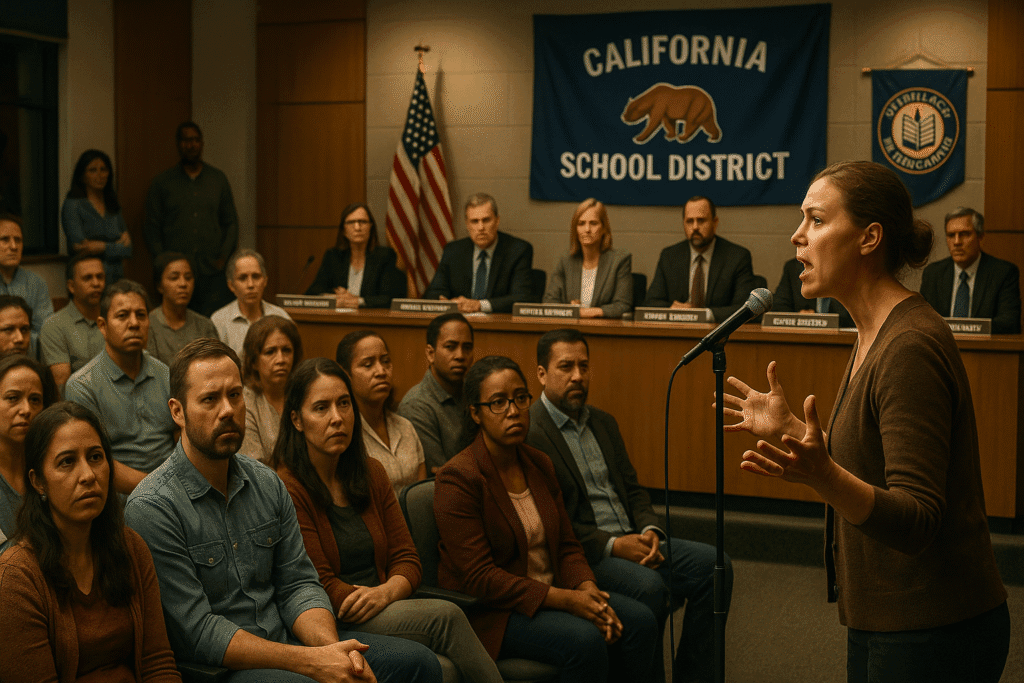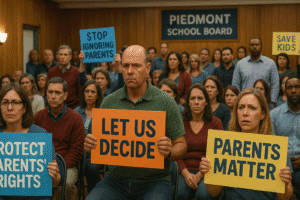Piedmont Parents Sound Alarm Over School Curriculum Shift


Piedmont, CA — The Piedmont Unified School District (PUSD) is facing growing scrutiny from parents and community members following a series of recent curriculum and policy changes. Many parents are voicing concerns about what they see as an increasing influence of federal mandates and progressive ideologies in local classrooms—raising important questions about transparency, parental rights, and the future direction of education in this affluent Alameda County suburb.
Transparency Under Fire
The most recent Piedmont School Board meeting drew an unusually large and vocal crowd, with dozens of parents filling the chamber and lining up to speak during public comment. At issue: new curriculum guidelines and instructional materials that, critics argue, were adopted with minimal public input.
Parent and Piedmont resident Laura Mitchell articulated a sentiment echoed by many: “Our district has always prided itself on academic excellence and community involvement. But these changes feel rushed and imposed, with little transparency. We want to know what our kids are being taught and why these decisions are being made behind closed doors.”
Among the most contentious changes are updates to social studies and health curricula, which now include topics such as gender identity, social justice frameworks, and expanded discussions of race and systemic inequality. While district officials say these updates are in line with California’s state standards and federal guidelines, many parents say they cross the line into political indoctrination.
Parental Rights Take Center Stage
A central refrain throughout the meeting was the importance of parental rights in determining what children are taught in public schools. Several speakers referenced the fundamental role of parents as the primary educators of their children, calling on the school board to involve families more closely in curriculum decisions.
“We’re not against teaching history or respecting all students,” said Joe Harper, a father of two elementary school students. “But we want the right to review materials and opt our kids out of content that doesn’t align with our family’s values. The district needs to respect that.”
Concerns also extended to new policies around student privacy, with some parents alleging that guidance from federal agencies encourages schools to withhold information from families about students’ social and emotional issues, especially regarding gender identity and pronoun use.
The School Board Responds
Under mounting pressure, members of the Piedmont School Board defended their actions, insisting that the changes were both necessary and legally mandated. Board President Susan Smith explained, “We have a duty to comply with state and federal requirements, but we are also committed to listening to our community. We welcome dialogue and want to ensure parents feel heard.”
Superintendent Dr. Randall Booker assured attendees that the district would increase efforts to communicate curriculum changes and provide opportunities for parental feedback. “We understand that this is a sensitive topic, and we are committed to transparency,” Booker said. He promised to hold additional forums and make instructional materials more accessible to parents online.
A Broader National Debate
Piedmont’s debate mirrors a national trend, as school districts across the country grapple with the intersection of local control and top-down mandates. Conservative advocacy groups have pointed to recent federal guidance on issues ranging from racial equity to gender identity as examples of government overreach, arguing that such directives undermine parental authority and local values.
Local parent group “Piedmont Families for Education Transparency” has launched a petition calling for a moratorium on all new curriculum changes pending a full public review. The group’s spokesperson, Michael Tran, emphasized, “We’re not anti-education or anti-inclusion. We just want to be part of the process and ensure that Piedmont’s standards reflect the values of our community—not just the latest trends from Sacramento or Washington, D.C.”
Moving Forward
As the meeting concluded, it was clear that the issue is far from resolved. The board agreed to schedule a special session focused exclusively on curriculum transparency and parental rights, promising to bring in outside experts and allow for extended public comment.
Many parents left the meeting feeling energized and determined to stay involved. As Laura Mitchell put it, “This is just the beginning. We want to work with the schools, but we’re not going to sit back and let someone else decide what’s best for our kids.”
Piedmont’s experience is a microcosm of a national conversation about who controls public education—and whose voices matter most. As the district navigates these challenges, one thing is clear: parents are demanding a seat at the table, and the school board will need to find a way to balance legal obligations with the values and concerns of its community.












